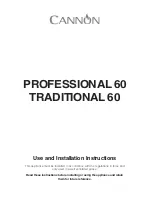
9
4. Use saber or keyhole saw to cut a 6
¹⁄₄
" (15.9 cm) diameter
opening.
5. Install vent through the vent opening in upper cabinet or wall.
Complete venting system according to the selected venting
method. See “Venting Requirements” section.
6. Use caulking to seal exterior wall or roof opening around the
cap.
Install Range Hood
1. Remove terminal box cover.
2. For vented model installations only:
Remove either top or rear rectangular vent knockout. Install
vent connector/damper using the 2 - #8B sheet metal screws
provided.
3. Depending on your installation, remove either back or top
wiring hole knockout.
NOTE: If the wall cap is directly behind the vent connector/
damper, the damper in the connector and wall cap must not
interfere with each other. Remove the vent connector damper
if it interferes.
4. Lift the range hood up under cabinet and determine final
location by centering beneath cabinet. Mark on the underside
of cabinet the location of the 4 keyhole mounting slots on the
range hood. Set range hood aside on a covered surface.
5. Use
¹⁄₈
" (3 mm) drill bit and drill 4 pilot holes as shown.
6. Install the 4- #10 x
⁵⁄₈
" mounting screws in pilot holes. Leave
about
¹⁄₄
" (6.4 cm) space between screw heads and cabinet
to slide range hood into place.
7. For Direct Wire Installations:
■
Install a UL listed or CSA approved strain relief.
■
Pull about 12" (30 cm) of wire through wall or cabinet and
into opening.
For Power Supply Installations:
■
Follow instructions included with power supply cord kit
marked for range hoods.
A. Terminal box cover
A. Wiring hole knockouts
B. Vent knockouts
C. #8B sheet metal screws
6
¹
/
₄
" (15.6 cm) diam.
Cabinet
cutouts
*From wall, not
cabinet frame
*4
³⁄₄
"
(12.1 cm)
A
A
B
C
C
A. Keyhole slot
A. Drill pilot hole.
A. UL listed or CSA approved strain relief
A
A
¹⁄₄
"
(6.4 mm)
WARNING
Electrical Shock Hazard
Disconnect power before servicing.
Replace all parts and panels before operating.
Failure to do so can result in death or electrical shock.
A










































